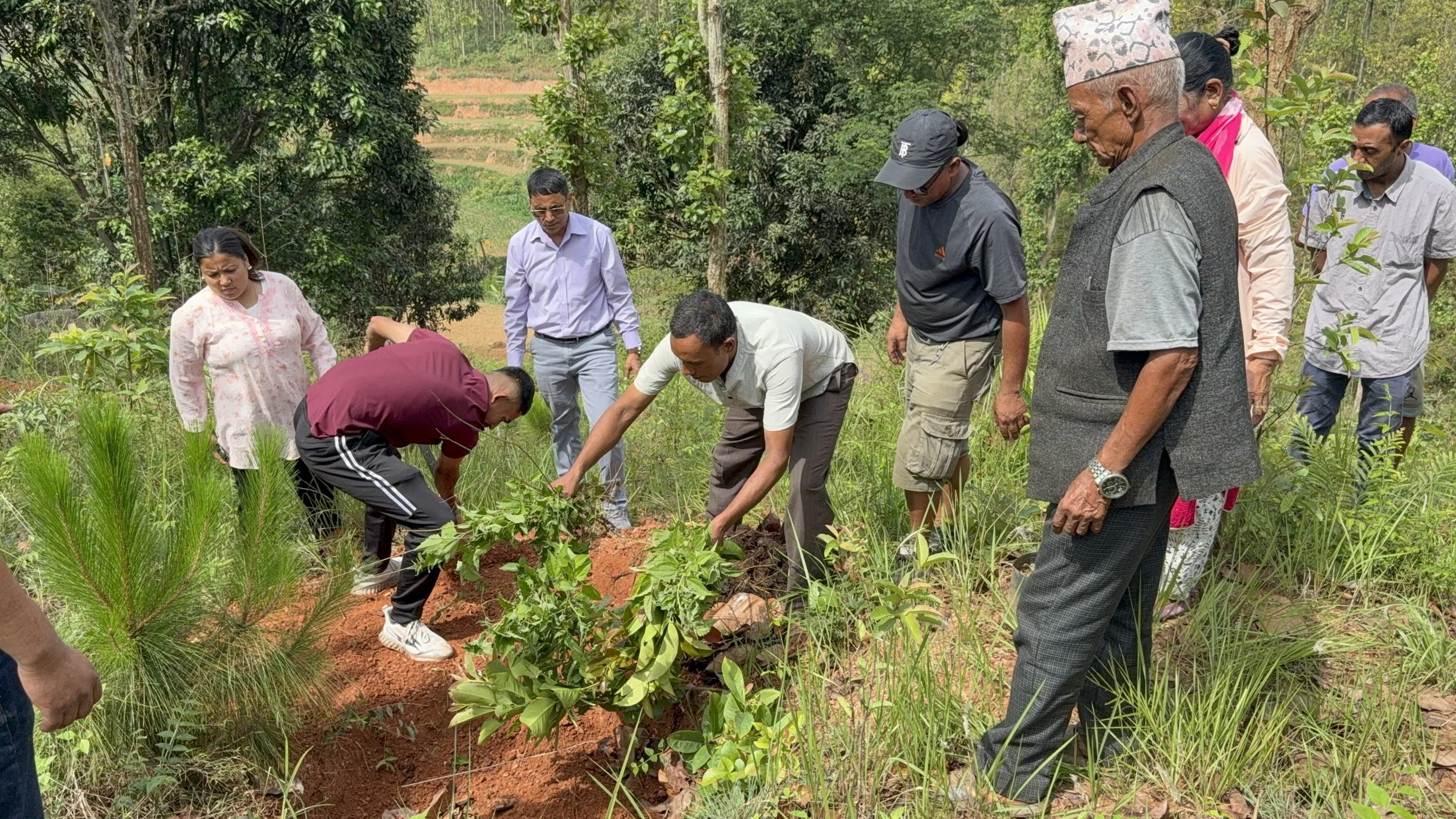Rebuilding Lives and Landscapes After the Kavre Landslide
When the hillsides gave way in late 2024, vast sections of Wards 10, 11 and 12 in Kavre District were left devastated. Buildings vanished under tonnes of earth, fertile farmland was stripped bare and dozens of families were forced out of their homes. In total, 50 houses were completely destroyed and nearly 200 more were severely damaged. It was a disaster that turned lives upside down.
But thanks to the remarkable support from the Margaret Hayman Charitable Trust and the heartfelt generosity of everyone who backed our Seeds of Hope crowdfunder, a coordinated and determined recovery effort began almost immediately. Since the turn of the year, the Mandan Deupur Agroforestry Resource Centre (MD-AFRC), working in close partnership with EcoHimal Nepal and local government bodies, helped affected communities not only recover but lay the groundwork for a more resilient future.
The first priority was emergency relief. Families whose homes had been destroyed received essential support - food, medicine and daily necessities - delivered directly to where they were sheltering. The MD-AFRC team worked closely with ward officials to ensure that aid reached every household in need, with special attention given to those most severely affected.
However, short-term relief was only the beginning. Long-term recovery meant rebuilding lives and land together. With entire farms swept away, replanting was essential - not just for restoring income, but also for stabilising fragile slopes and preventing future disasters. That’s where agroforestry came in. Over 4,600 fruit-tree saplings- avocado, apple, coffee, pomegranate, guava and more - were raised at MD-AFRC. These trees are now being distributed to 161 of the most affected households, each of whom has prepared specialised planting pits ready for the summer season. Should any shortages arise, a network of satellite nurseries is ready to provide additional trees.
Recognising that fruit trees take years to bear results, MD-AFRC also distributed fast-growing vegetable seeds to help families bridge the gap. Crops like spinach, beans and carrots were planted quickly on small, cleared plots of land, helping restore household food supplies and generate early income. Many families have already sold their first harvests at the Nagarkot Haat Bazaar, and work is underway to link them with Kathmandu’s organic markets.
To make all this sustainable, the project places strong emphasis on training. MD-AFRC organised hands-on workshops to equip both farmers and nursery staff with the skills needed to care for young plants and manage new orchards effectively. From pit digging and pruning to composting and pest control, these sessions ensured that everyone involved had the tools and confidence to make their recovery efforts thrive.
Meanwhile, MD-AFRC’s own infrastructure has been strengthened. A new high-tech polyhouse has been installed to protect fragile seedlings before they’re planted in the open. A 6m³ biogas system, developed with support from the local government, now powers parts of the centre using clean, sustainable energy. Plans are also underway to fence the nursery to protect stock from animals, with some funding already secured from Ward 11.
The satellite nurseries have also played a crucial role, producing over 18,000 seedlings across a range of high-value tree crops. In May 2025, a new national Agro-Forestry Network was formally launched, linking MD-AFRC, the satellite nurseries and the EcoHimal Agro-Forestry Academy. This collaboration ensures that agroforestry knowledge, resources and support can reach more communities, more quickly and more effectively.
Looking ahead, the MD-AFRC team will continue to monitor planting progress through the summer and into the monsoon. Plans are in place to launch a community seed bank to protect and share local crop varieties and a new cold-storage facility is also being developed to help farming families keep produce fresh for longer, improving both income and food security.
This landslide was devastating - but it did not defeat Kavre’s communities. Thanks to your support, recovery has taken root. Fields are green again, families are harvesting food and new trees are taking hold on the hillsides. This is what resilience looks like: a partnership between people, place and purpose.
A special thank you goes to our legacy supporters from the Seeds of Hope campaign. We are incredibly grateful to Rodney Franklin, Chris Hill, Andrew James, David Kellie-Smith, Renate Nahum, Mary Peart and Huw Roberts for their generosity.
For these kind people and the rest of the fantastic supporters of our Seeds of Hope campaign, I will be in touch shortly with specific updates, media and the opportunity for a Q&A with the team!

